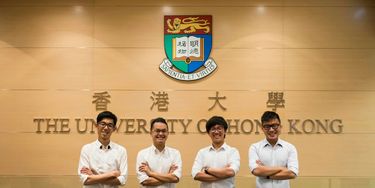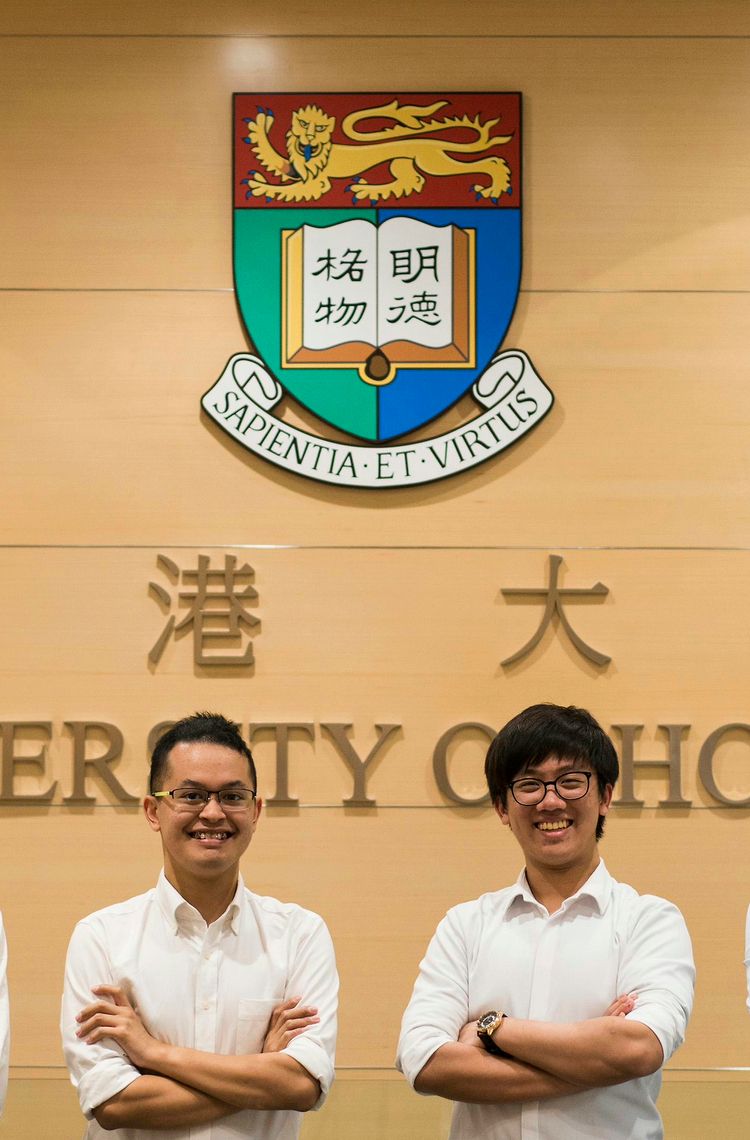Hayden Li, Airbus Fly Your ideas
“Sometimes the simple solution is the best”
Airbus’ 2017 Fly Your Ideas competition was won by Team DAELead from the University of Hong Kong, with their design for a Private Stowage Compartment (PSC). Team member Hayden Li offers insight into the team’s approach.
Hayden Li, now in his third year of a Mechanical Engineering degree, knew he wanted to focus on aerospace even before he embarked on his studies. While on a Cathay Pacific education programme for young people, this student – who originally comes from Vancouver – witnessed aircraft operations up close: “I saw the planes on the tarmac and I was hooked.”
His reasons for signing up to Fly Your Ideas were to gather more in-depth, hands-on experience of the industry, including how to actually design and install a product on a plane – with a view to working in this sector in the future. But he also learned how to challenge his own thinking: trying an idea, testing, refining.

Inspiration starts at home
The winning design was praised for its attention to detail and the 4-member team spent some 8 months developing it, inspired by the smart storage solutions found in Hong Kong’s notoriously small homes: the PSC fits below passengers’ feet, utilising the empty space between the cargo bay ceiling and cabin floor.
Hayden believes that such competitions are important to inspire students to take up science and technology – as is an up-to-date curriculum, including topics like programming. But, he says, it’s not just students who benefit from these contests, as they also “give industry the chance to gain ideas they’ve never seen before.” And he encourages other students to simply get involved – thinking creatively and not over-complicating their design: “In engineering and innovation, sometimes the simple solution is the best!”
Dr Yacob Astatke, Airbus Diversity Award
“Empowering your students is what’s important”
Dr Yacob Astatke is the Assistant V.P. for International Affairs at Morgan State University in the US, as well as the winner of the 2016 GEDC Airbus Diversity Award. He has spent his professional life inspiring future generations of engineers.
“Growing up in Ethiopia, I was always interested in figuring out how electronics equipment worked. I used to take apart my dad’s old radios,” Dr Yacob Astatke recalls. His passion for engineering grew through his studies in the US, propelling him into academia, where he can now pass this passion onto future generations: “They are the ones who will come up with solutions to the ‘grand engineering challenges’ for years to come.”
His work engaging students takes multiple forms, including his teaching at Morgan State University and summer camps for younger learners in the US – where he shows them, above all, that engineering is fun. “Attracting and keeping young minds is a challenge,” he explains, with presenting hands-on applications, rather than starting with theory, key.
Limitless energy
In his native Ethiopia, however, universities are flooded with students but can’t offer the programmes or equipment the US can. When Yacob left, he promised he would return one day, and around a decade ago he began making trips back to teach. He was then involved in the mobile studio project, which has transformed a costly piece of engineering equipment into a simplified, portable device, more accessible for African institutions.
Now he returns to Africa at least three times a year, teaching, bringing equipment, and working with the African Engineering Deans Association. But what gives him his limitless energy? “When I was last in Ethiopia, a group of students and faculty members showed me their version of the mobile device, which they had designed and built. It brought tears to my eyes. Empowering your students is what’s important. You give them a direction, they will come up with their own roadmap.”
Uma Subramanian, project executive at A^3
“I love the thrill of getting something started”
Uma Subramanian has been a project executive at A^3, Airbus’ Silicon Valley outpost, since 2015. Her career highlights the value of seizing each new opportunity to learn.
“I believe growth comes from experimentation. I view my life as a series of experiments,” says Uma Subramanian, underlining how her less-than-linear career path has helped her succeed in her current role. It’s a journey that has offered diverse opportunities to learn – from corporations to start-ups, from engineering to business.
A childhood fascination with space exploration led her first to Space Camp and later to an aerospace engineering degree – after which she worked on the F/A-18 fighter jet and the NASA programme which is today Project Orion. However, her interest in the economics of space exploration shifted her focus from engineering and towards a Harvard MBA.
Building something that will endure
“Aerospace is my first love. But in more recent years, I’ve also come to love business, especially early stage business,” she explains. “I love the thrill of getting something started and seeing it go.” Unsurprising, then, that after working in a consultancy and for Rolls-Royce, she dived into a more operational role in a smaller company, as European General Manager for an online platform for home services.
“That was probably the best training I could have had for my job at A3”, she explains, where one of her main projects has been Voom, an on-demand helicopter service for urban transportation. Uniting her twin passions of aerospace and business, Voom also epitomises her desire to keep pushing herself: “I want to do something that has a real and significant impact. It’s this drive that inspires me to embrace new challenges.”
Alexandre Godin, Airbus Innovator
“It is about immersion and engagement”
Alexandre Godin is coordinating mixed-reality technologies implementation at Airbus. Earlier this year, he shaped a team that has developed an innovative way of learning for employees, leveraging these technologies.
“I love its limitless capability to extend human horizons and understandings,” says Alexandre Godin on his passion for Virtual Reality and Augmented Reality, a passion nurtured from his background in technology, user experience and human computer interaction. “It is about immersion and engagement, which are proven levers for people to better understand, learn and develop empathy and flexibility.”
This is the basis for the new enterprise learning tool that Alexandre’s team have developed to immerse Airbus newcomers in the company. The project brought together team members from wildly differing backgrounds and disciplines, as well as linking with Airbus’ Leadership University to test the prototype and the Silicon Valley-based think tank Singularity University to support the design phase.
Springboard to bigger ambitions
Their work turned into an enriching experience, with their collective efforts moving the project forward and ensuring that an educational tool also became an opportunity for experts in their field to learn from each other. “The way we completed the project was as important as the technical result,” he underlines.
With testing of the prototype ongoing, the feedback is only positive and the team is confident about rolling it out. And it is one of many similar initiatives at the company. “I want this project to have an impact on individuals and organisations,” Alexandre concludes. “I really hope that it will make a difference and will bring added value to the business.”
Joanne Foster
